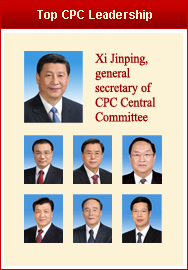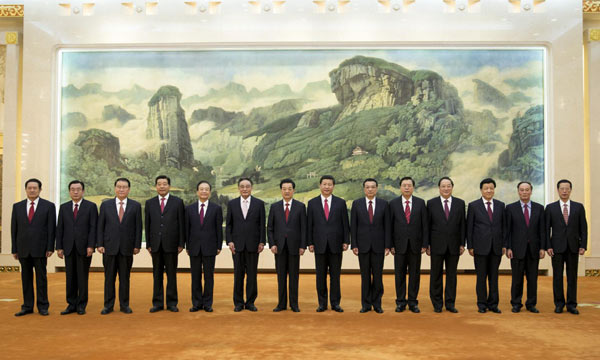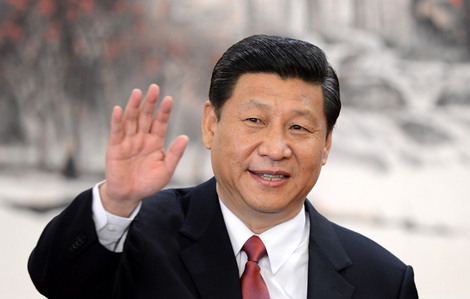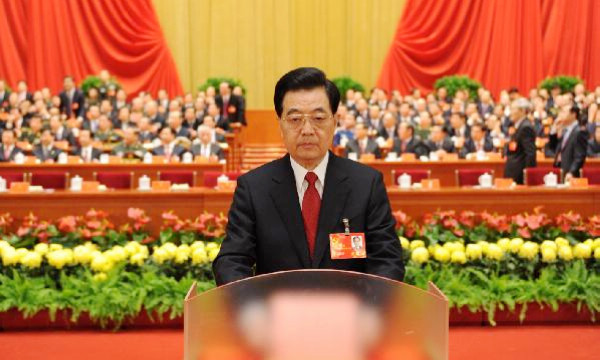Full text of Constitution of Communist Party of China
(Xinhua)
Updated: 2012-11-21 11:23
Chapter V
Primary Organizations of the Party
Article 29. Primary Party organizations are formed in enterprises, rural areas, government organs, schools, research institutes, communities, social organizations, companies of the People's Liberation Army and other basic units, where there are at least three full Party members.
In primary organizations, primary Party committees and committees of general Party branches or Party branches are set up as the work requires and according to the number of Party members, subject to approval by the higher Party organizations. A primary Party committee is elected by a general membership meeting or a meeting of delegates, the committee of a general Party branch or a Party branch is elected by a general membership meeting, and candidates for these committees are nominated on the basis of extensively soliciting opinions from Party members and non-Party persons.
Article 30. A primary Party committee is elected for a term of three to five years, while a general Party branch committee or a Party branch committee is elected for a term of two or three years. Results of the election of a secretary and deputy secretaries of a primary committee, general branch committee or branch committee of the Party shall be reported to the next higher Party organization for approval.
Article 31. The primary Party organizations are militant bastions of the Party in the basic units of society, where all the Party's work proceeds and they serve as the foundation of its fighting capacity. Their main tasks are:
1) To disseminate and carry out the Party's line, principles and policies, the resolutions of the Central Committee of the Party and other higher Party organizations, and their own resolutions; to give full play to the exemplary and vanguard role of Party members, to excel in their work, and to unite and organize the cadres and the rank and file inside and outside the Party to fulfill the tasks of their own units.
2) To organize Party members to conscientiously study Marxism-Leninism, Mao Zedong Thought, Deng Xiaoping Theory, the important thought of Three Represents and the Scientific Outlook on Development, study the Party's line, principles, policies and resolutions, acquire essential knowledge concerning the Party and obtain general, scientific, legal and professional knowledge.
3) To educate, manage, oversee and serve Party members; raise their overall quality; strengthen their Party spirit; ensure that they regularly participate in the activities of Party organizations, make criticism and self-criticism, and maintain and observe Party discipline; see that they truly fulfill their duties; protect their rights from encroachment; and improve management of Party members among the floating population.
4) To maintain close ties with the masses, constantly seek their criticisms and opinions regarding Party members and the Party's work, safeguard the legitimate rights and interests of the masses and do effective ideological and political work among them.
5) To give full scope to the initiative and creativity of Party members and the masses and to discover, nurture and recommend fine, talented people from among Party members and the masses and encourage them to contribute their skills and learning to reform, opening up and socialist modernization.
6) To educate and train the activists who apply for Party membership, attend to the routine work concerning the recruitment of new members and attach great importance to recruiting Party members from among those in the forefront of production and work and from among young people.
7) To see to it that Party and non-Party cadres strictly observe the law and administrative discipline and the financial and economic statutes and personnel regulations of the state and that none of them infringe on the interests of the state, the collective or the masses.
8) To encourage Party members and the masses to conscientiously resist unhealthy practices and wage resolute struggles against all illegal and criminal activities.
Article 32. The primary Party committees in communities, townships and towns and the Party organizations in villages and communities provide leadership for the work in their localities and assist administrative departments, economic institutions and self-governing mass organizations in fully exercising their functions and powers.
In a state-owned or collective enterprise, the primary Party organization acts as the political nucleus and works for the operation of the enterprise. The primary Party organization guarantees and oversees the implementation of the principles and policies of the Party and the state in its own enterprise and backs the meeting of shareholders, board of directors, board of supervisors and manager (factory director) in the exercise of their functions and powers according to law. It relies wholeheartedly on the workers and office staff, supports the work of the congresses of representatives of workers and office staff and participates in making final decisions on major questions in the enterprise. It works to improve its own organization and provides leadership over ideological and political work, efforts for cultural and ethical progress and the trade unions, the Communist Youth League and other mass organizations.
In a non-public economic institution, the primary Party organization carries out the Party's principles and policies, provides guidance to and oversees the enterprise in observing the laws and regulations of the state, exercises leadership over the trade union, the Communist Youth League organization and other mass organizations, rallies the workers and office staff around it, safeguards the legitimate rights and interests of all quarters and stimulates the healthy development of the enterprise.
In an institution where the administrative leaders assume full responsibility, the primary Party organization acts as the political nucleus. In an institution where the administrative leaders assume full responsibility under the leadership of the Party committee, the primary Party organization discusses and decides on major issues and at the same time ensures that the administrative leaders are able to fully exercise their functions and powers.
In offices of the Party or the state at all levels, the primary Party organizations assist the chief administrators in fulfilling their tasks and improving their work. They exercise oversight over all Party members, including the chief administrators who are Party members, but do not direct the work of their units.
Related Stories
Full text of Hu's report at 18th Party Congress 2012-11-18 17:01
Full text of Xi's address to the media 2012-11-16 14:02
Full text of resolution on CPC Central Committee report 2012-11-14 13:55
Full text of resolution on amendment to CPC Constitution 2012-11-14 13:27
Full text of resolution on CCDI work report 2012-11-14 13:21

Top News
Xi emphasizes adherence to CPC Congress spirit
Top legislator urges implementation of congress spirit
Moderately prosperous China brings chances to world
Video







